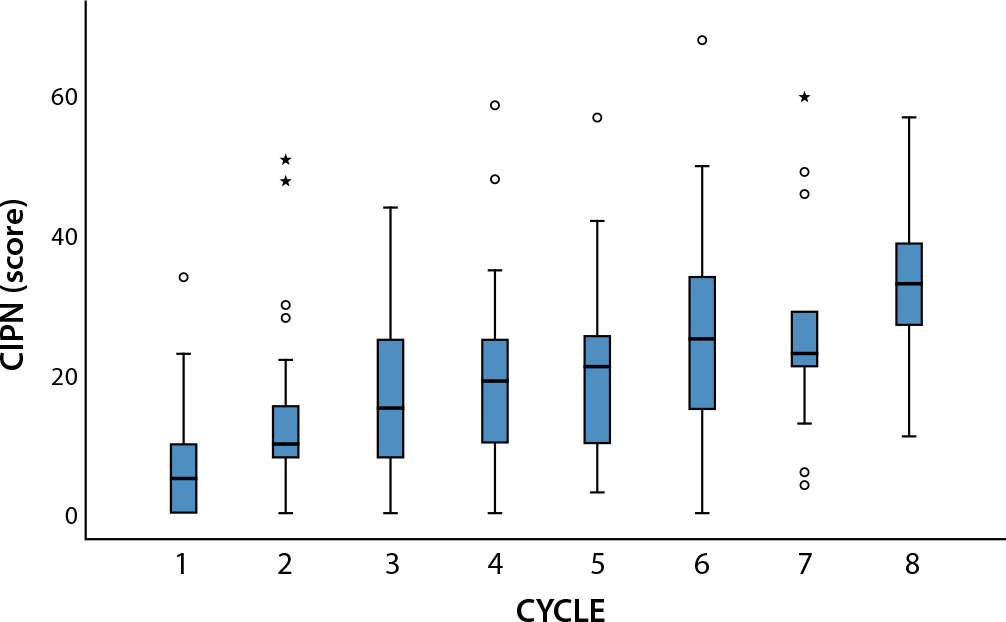-
ORIGINAL ARTICLE
Adverse dermatoneurological events and impacts on daily activities of patients with gastrointestinal neoplasms undergoing chemotherapy
Revista Brasileira de Enfermagem. 2023;76(1):e20220161
01-30-2023
Abstract
ORIGINAL ARTICLEAdverse dermatoneurological events and impacts on daily activities of patients with gastrointestinal neoplasms undergoing chemotherapy
Revista Brasileira de Enfermagem. 2023;76(1):e20220161
01-30-2023DOI 10.1590/0034-7167-2022-0161
Views0ABSTRACT
Objective:
to associate the presence and grading of adverse dermatoneurological events (peripheral neuropathy and hand-foot syndrome) and the interference in the activities of daily living of patients with gastrointestinal neoplasms undergoing systemic antineoplastic treatment.
Method:
this is a longitudinal, prospective study, using instruments to assess hand-foot syndrome and peripheral neuropathy.
Results:
there were 36 patients: 66.7% diagnosed with colon cancer and 83.2% on combination therapy. From cycle 5 onwards, all of them had hand-foot syndrome, with a majority of grade 1, unrelated to interference in activities of daily living. Regarding peripheral neuropathy, there was a moderate to strong correlation from cycle 1 of treatment.
Conclusion:
peripheral neuropathy negatively affects activities of daily living. The monitoring of dermatoneurological events by oncology nurses contributes to the clinical practice of nursing and subsidizes the development of advanced practice in the country.
Keywords:Activities of Daily LivingAdverse EventsAntineoplasticGastrointestinal NeoplasmsNursing OncologySee more
-
RESEARCH
Nursing educational intervention for the identification of Adverse Events in hemodialysis
Revista Brasileira de Enfermagem. 2018;71:1507-1513
01-01-2018
Abstract
RESEARCHNursing educational intervention for the identification of Adverse Events in hemodialysis
Revista Brasileira de Enfermagem. 2018;71:1507-1513
01-01-2018DOI 10.1590/0034-7167-2017-0843
Views0See moreABSTRACT
Objective:
To develop an educational program aimed at the qualification of the nursing technicians that makes possible the understanding of Adverse Events (AE), aiming to adapt the data records; to elaborate tools for the records of the AE in hemodialysis patients; and to assess the knowledge before and after the educational program.
Method:
An educational intervention was conducted through a classroom and online course on how to recognize and record AE in hemodialysis. The effectiveness of the program was assessed through the gain of knowledge measured through online record of the AE in fictitious problem cases before and after the course.
Result:
Sixteen nursing technicians participated in the study. In the initial test, the mean score was 3.7 ± 0.3 points and in the final assessment was 4.2 ± 0.3 points (p=0.0002).
Conclusion:
It was possible to verify that the educational intervention contributed to increase the knowledge of the participants and that the training of these can be achieved with classroom and online learning courses.



